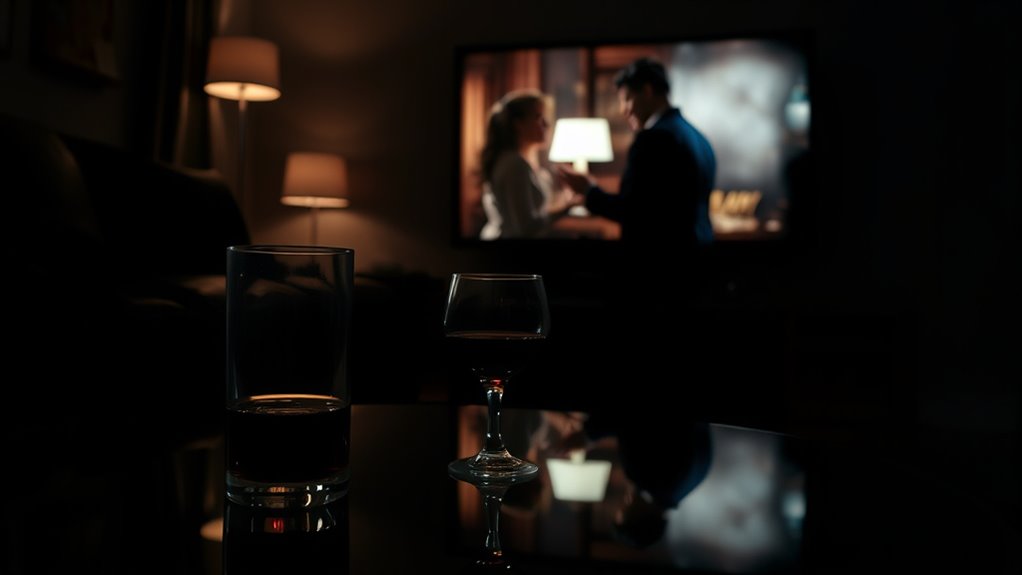Pop culture shapes your view of infidelity by often glamorizing or romanticizing cheating as exciting, rebellious, or unavoidable. TV shows and movies frequently portray affair characters as daring or misunderstood, making infidelity seem more accepted or less harmful. This constant exposure influences your beliefs about relationships, suggesting betrayal is common and sometimes justified. If you’re curious how these portrayals impact your perceptions even more, keep exploring how media influences your views on fidelity and commitment.
Key Takeaways
- TV shows often glamorize infidelity as a form of rebellion or personal freedom, normalizing cheating behaviors.
- Movies tend to depict emotional chaos and guilt following infidelity, shaping perceptions of betrayal’s consequences.
- Social media and celebrity scandals portray affairs as glamorous or daring, influencing attitudes toward fidelity.
- Media narratives can justify cheating, making it seem like a minor mistake or a natural response to dissatisfaction.
- Repeated portrayals blur moral boundaries, leading audiences to view infidelity as common, less serious, or more acceptable.

Have you ever wondered how pop culture shapes our views on infidelity? It’s a question that hits close to home because TV shows, movies, and even social media constantly portray cheating in ways that influence your perceptions and expectations. When you watch a character cheat and get away with it or face dramatic consequences, your mind begins to form ideas about what infidelity looks like and how it impacts relationships. These portrayals can make cheating seem glamorous, justified, or just a common part of life, which can distort your understanding of its real-world implications.
In many popular shows, infidelity is often depicted as a thrilling escape or a sign of a flawed but relatable character. You might see a protagonist indulge in secret affairs, and it’s framed as a moment of personal freedom or rebellion. This glamorization can make cheating appear enticing or even acceptable, especially when the storyline makes you empathize with the character’s desire for excitement or validation. It’s easy to start thinking that infidelity is just a small mistake or a way to spice things up, rather than a betrayal that can cause profound hurt and long-term damage.
Movies tend to portray infidelity with heightened drama, emphasizing the emotional fallout and the chaos it creates. You see characters grappling with guilt, heartbreak, or revenge, which can make you believe that cheating always leads to dramatic consequences. But they also sometimes romanticize affairs as passionate and unavoidable, reinforcing the idea that love is complicated and that cheating is an inevitable part of human nature. Such portrayals shape your expectations, making you think that relationships are fragile and that cheating is a common, almost expected, response to dissatisfaction.
Movies dramatize infidelity, blending passion with chaos, shaping beliefs that relationships are fragile and betrayal inevitable.
Social media and celebrity culture add another layer, often showcasing affairs as glamorous or as a badge of rebellion. When you see public figures or influencers involved in scandals, you might start to see infidelity as exciting or even desirable. These images can diminish the perceived seriousness of cheating, making it seem less harmful or more glamorous than it truly is. The portrayal of infidelity as something daring or rebellious can influence your own attitudes, making you question the boundaries of fidelity and commitment. Furthermore, the frequent exposure to such stories can create a distorted view of morality that blurs the line between right and wrong in relationships.
Frequently Asked Questions
How Do TV Shows Influence Real-Life Attitudes Toward Cheating?
TV shows influence your attitudes toward cheating by portraying it in ways that can seem justified or glamorous. When characters cheat and face little consequences, you might start to see infidelity as less serious. Conversely, shows that show the emotional pain and fallout can make you more cautious. Ultimately, what you watch shapes how you view honesty, fidelity, and relationships, often subtly affecting your own beliefs and behaviors over time.
Are Portrayals of Infidelity Realistic or Exaggerated in Media?
You might wonder if media portrayals of infidelity are realistic or exaggerated. Often, they lean toward dramatization for entertainment, showing affairs with heightened emotions or quick resolutions that rarely match real life. While some situations reflect genuine issues, many scenes are exaggerated to evoke stronger reactions. Remember, TV and movies aim to entertain, so their depiction of cheating isn’t always an accurate reflection of how infidelity unfolds in reality.
What Psychological Effects Do Infidelity Storylines Have on Viewers?
Like Pandora’s box, infidelity storylines open hidden emotions and fears you might not realize you harbor. Watching these plots can cause feelings of betrayal, distrust, or guilt, even if you’re not directly involved. You might also develop unrealistic expectations or fears about relationships. These narratives can shape your perceptions, sometimes leading you to question your own love and loyalty, or fueling anxiety about infidelity’s role in your life.
How Has the Depiction of Cheating Evolved Over Different Decades?
You’ve probably noticed that the way cheating is portrayed on screen has changed over the decades. In earlier eras, cheating was often shown as a dramatic, scandalous act with serious consequences. Today, it’s more nuanced, sometimes portrayed as complex or even sympathetic. This evolution reflects shifting societal attitudes, making infidelity stories more relatable and less black-and-white, shaping how you perceive and understand cheating in real life.
Do Media Portrayals Impact the Likelihood of Viewers Engaging in Infidelity?
You might think media influences your choices, but it’s more subtle than that. While movies and TV shows often glamorize cheating or portray it as harmless, they also depict the emotional pain and consequences. This juxtaposition makes you reflect on morality versus temptation. So, rather than directly causing infidelity, media shapes your perceptions, making you more aware of the complexities and potential fallout, which can influence your own behavior.
Conclusion
Ultimately, pop culture’s portrayal of infidelity influences your perceptions, painting promiscuity with a provocative palette. By blurring boundaries between betrayal and beauty, movies and TV tempt you to tolerate temptation. Recognize the reckless romance reinforced by relentless repetition, and remember that real relationships require respect, not ruse. Stay skeptical of sensational stories, and aim for sincerity over sensationalism, ensuring your understanding of love remains rooted in reality, not in the romanticized sphere of reckless narratives.









